- Home
- Tim Powers
Three Days to Never: A Novel Page 12
Three Days to Never: A Novel Read online
Page 12
Tina Iyana-Kurtycz closed her eyes and shook her head. “How should I know? I don’t even know German.”
“Schneid mal die Kehle auf,” repeated the gaunt woman in the seat next to her, staring out the window.
“What you said means ‘Cut open her throat,’” Golze said. “It was involuntary, yes?”
“Yes. I wouldn’t voluntarily interfere in a, an area of measurement.”
Golze seemed almost pleased. He looked down and clenched one fist in front of his chest, where only Charlotte could see, if she happened to be paying attention to him.
Eight
While Daphne was in surgery, Marrity blundered outside for a much needed cigarette. The glow of self-satisfaction at having saved her life was beginning to fade into shadows of worry. What if she does this again? he asked himself as he plodded across the glossy brown-tile floor of the hospital lobby to the electric-eye doors.
Should I start making sure I’ve always got a knife and a Bic pen on me? Give the sitter instructions on how to do a tracheotomy?
He was only aware of how chilly the hospital air was when the doors swung open and he stepped out into the the dry, sage-scented breeze. I wonder if I can go back to work tomorrow, he thought. Tomorrow is Modern Novel, and I should prepare a lecture tonight. My briefcase is in the truck at the Alfredo’s parking lot—I’ll take a cab there, drive the truck back, and then put the lecture together in the lobby here.
A slim, dark-haired woman in sunglasses was standing by the planter to the left of the door, and as he fumbled a pack of Dunhill cigarettes out of his coat pocket, she dropped a smoking cigarette butt onto the pavement and stepped on it and then took a pack of Dunhills out of her black leather purse.
“If they’re going to kill us, we may as well smoke the best, right?” he said, holding up his pack.
She frowned at him, then tucked her own pack back into her purse and hurried past him into the lobby.
“Good, Frank, good,” he muttered to himself, feeling his face heat up. “Always break the ice with a remark about dying. Especially to somebody standing in front of a hospital.” But maybe she didn’t speak English. He noticed half a dozen identical flattened cigarette butts on the pavement where she’d been standing.
He lit a cigarette and took a deep drag on it, then exhaled and leaned back against the pebbled-stone planter. Passing cars glinted in the afternoon sun on Twenty-first Street just beyond the iron fence at the edge of the hospital lawn, and he envied the drivers whatever concerns were theirs.
She’s just got to be meticulous about chewing everything very thoroughly, he thought. Every swallow should be a careful, conscious action. Probably after this she won’t even need reminding. I’m glad we painted her bedroom today. I wonder what that damned movie was, and why my father seemed to be interested in it.
And why was he at Alfredo’s today? He must have followed us. That’s unpleasant. I think we’d be better off having no further contact with him; to hell with why he visited Einstein in ’55. Maybe the letters will give me a clue, before I sell them.
“I’m sorry,” said a woman’s voice behind him; he turned and saw that it was the woman in the sunglasses.
I was distracted,” said Charlotte Sinclair. “You were talking about the cigarettes. You’re right, we may as well kill ourselves with the best.”
So far so good, she thought, and she checked herself out through Francis Marrity’s eyes: black jeans, loose burgundy short-sleeved blouse, and dark brown hair pulled back in a ponytail; she noted a strand of stray hair dangling above one eyebrow and smoothed it back.
They were alone on this breezy strip of shaded sidewalk, and she wished she could see Marrity’s face.
“That was my last, in fact,” she added, assessing her rueful smile.
“Would you like one of mine?” he said, and he held his pack out in front of himself.
“Thanks,” she said, watching her own fingers to guide them as she reached out and picked a cigarette from the pack. “I owe you.”
Denis Rascasse’s Vespers research gang had reported that Marrity smoked Dunhills, so they had found a liquor store that carried the British cigarettes; on the drive here one of the Vespers men had broken several of the cigarettes and lit them and instantly ground them out, so that Charlotte could scatter the butts around where she’d stand.
Marrity’s field of vision shifted from her to the lawn, so she said, “Are you visiting somebody?”
Again she saw herself in his vision. “Yes, my daughter’s having her throat stitched up. Uh—tracheotomy.” He paused, and then his left hand was holding out his wallet, tilted toward her. “Daphne,” he said. “She’s twelve.”
Apparently he was showing Charlotte a photograph of his daughter. She took off her sunglasses and lowered her eyes until she seemed to be staring at the wallet. “Very pretty girl,” Charlotte said.
“Yes.” Marrity glanced at the picture himself before putting the wallet away.
She looks like I used to, Charlotte thought, and then thrust the thought away.
After a pause in which he might have smiled, Marrity went on, “You too? I mean, not a daughter with a tracheotomy—”
“A neighbor of mine. They won’t let me see her yet, but—‘We also serve who only stand and wait.’”
”‘ When I consider how my light is spent,’” Marrity said, quoting the beginning of the poem, “’ere half my days in this dark world and wide—”
This one she hadn’t been prompted with on the drive over here; it was Milton’s sonnet “On His Blindness,” and years ago she had got someone to read it onto a tape and had memorized it. “‘And that one Talent which is death to hide, lodged with me useless,’” she said, keeping the usual bitterness out of her voice. “You don’t meet a lot of Milton fans in San Bernardino.”
“My excuse is that I teach literature at Redlands.”
“Ah. I was a career English major. I quote poetry the way Christians quote the Bible.” Time for one of the Housman bits she’d been primed with: “‘And starry darkness paces the land from sea to sea, and blots the foolish faces of my poor friends and me.’” That was adequately placed, she thought, and Rascasse said it was underlined in Marrity’s copy.
“Housman!” she heard him exclaim. “My favorite! My name’s Frank Marrity. And you are…?”
“Libra Nosamalo Morrison.” She held out her right hand. “My parents were Catholic, with an odd sense of humor.”
“Libera nos a malo, deliver us from evil.” She watched him reach out and take her hand. “Well, it’s unforgettable.”
She smiled, admiring her white teeth.
“I’ve got to say I’ll be ready for a drink,” she said, “not too long after the sun goes down.” She leaned back against the planter and closed her eyelids to check the eyeshadow through Marrity’s gaze. It looked fine, and she raised her eyelids and swiveled the plastic eyes until Marrity saw the carbon pupils seeming to look straight at him. “A scotch on the rocks—Laphroaig, ideally.”
He let go of her hand, and his voice was cautious when he said, “Yes, that’s good scotch. I’d love to join you, but I can’t.”
Charlotte wished someone would walk by so that she could see Marrity’s face—were his eyebrows up in surprise? lowered in a suspicious frown?—for she was suddenly sure that she had pushed it too far. You were doing fine without the Laphroaig, she told herself furiously; just because Rascasse’s crew found several bottles of it in Marrity’s cupboard didn’t mean you had to go and mention it right away. What must Rascasse be thinking, listening to the transmission of this conversation?
She found that she was reflexively thinking of the song “Bye Bye Blackbird”—no one here can love or understand me—and she recalled that it had been her old eavesdropper-warning signal in the missile-silo days of her childhood. But of course Marrity doesn’t even know that the song was a code, she thought; and why should I want to warn Marrity, anyway?
She put her sunglasses back on.
“Another time?” she asked, watching her face to be sure she kept the expression cheerful. “I’d trust my phone number to anybody who knows Milton and Housman.”
“Yes, thanks. I just can’t really think about anything but my daughter right now.”
“Of course.” By touch she found a card in her purse, and held it out to him. She read it through his eyes: Libra Nosamalo Morrison, Veterinary Medicine, (909) JKL-HYDE.
“A Stevenson fan too,” she heard him say.
The hastily printed card seemed idiotically clumsy now. “Well,” she stammered, “like Heckle and Jeckle—those crows, in the cartoons—and hide—”
“And I bet you specialize in cats.” The card disappeared from his view, and she hoped he had put it in his pocket and not just dropped it. “I’d better go back and see if she’s out of surgery yet,” he said. “It’s been nice meeting you, uh, Libra!”
“You too, Frank! Give me a call!”
His view was of the opening doors now, and the reception desk and gift-shop counter in the lobby; she turned away, so that when he looked back at her he wouldn’t hesitate to stare; but he looked only straight ahead, at the corridor leading to the elevators.
When he had rounded the corner and pushed one of the elevator buttons, she raised her right hand, wide open, and heard a car accelerating toward the curb where she stood.
“I’m a viewer, not a spy,” she muttered into the microphone at her throat.
The driver of the car that had now stopped in front of her craned his neck to peer into the rearview mirror, and she saw it was Rascasse himself.
She groped till she felt the door, then found the handle and opened it.
“You knew his birth date too,” said Rascasse. “Why did you not tell him you had the same birthday? You could have shouted it after him, as he was leaving.” His French accent was more pronounced when he was angry, and higher in pitch. Charlotte could imagine it was a woman speaking.
“So what do we do now,” she asked dully as she pulled the door closed.
“If this…debacle just now was enough to let him know somebody’s trying to approach him covertly, probably we will have to kill him, and then get somebody less clumsy to approach Moira and Bennett Bradley, and the daughter.”
She looks like I used to, thought Charlotte again.
She settled back in the seat and fastened the shoulder strap. It was good meeting you, Frank, she thought as Rascasse steered the car out of the hospital driveway and clicked the turn-signal lever for a right turn onto Waterman. You seem like a good man, a widower doing his best with a young daughter—you even saved her life today!—and you’re the first guy I’ve met who’s known what the Milton line was from. But I’m afraid I’ve killed you by mentioning your favorite scotch.
And I won’t try to stop it. I’m not a good person, you see. I used to be, and soon—if Rascasse succeeds in this and keeps his promises—I’ll get another chance to be one, starting over again.
I’ll get a better life then; or she will, anyway—the girl I used to be, my “little daughter,” who looks so much like your Daphne. I have done nothing but in care of thee. And she won’t know about any of this terrible stuff I do to get it for her. And she won’t be blind. She won’t be blind.
Oren Lepidopt stood on the carpet in Frank Marrity’s now dark living room, looking around at the shapes that were the table and the television and the rows of shelved books whose titles he couldn’t read now. He had studied them when there had still been light, though—lots of Stevenson and the Brontës and Trollope in this room, while poetry and drama and encyclopedias lined the shelves that hung above head height up the hall, and history and philosophy and modern novels filled the shelves in the uphill living room. Poetry, history, and philosophy were in chronological order, novels alphabetical.
The girl’s room had been painted today—the bed had been moved to the center of the linoleum floor, and a little desk and a couple of bookcases had been shoved up against it, with a rolled-up rug and a couple of wicker baskets stacked right on the bed, everything covered by a brown paper drop cloth. When he had peered under it, Lepidopt had seen The Wind in the Willows and Watership Down among the books in one of the bookcases; the baskets contained recent rock tapes and albums, with a lot of Queen. A black shellac jewelry box with blue-velvet-covered dividers and slits for rings held two gold bracelets, some earrings, and a wedding ring—presumably her mother’s.
Lepidopt thought of his son’s disorderly room, in their apartment on Dizengoff Street in Tel Aviv. Louis was only a year younger than Daphne, and he liked Queen too. Lepidopt’s wife, Deborah, had been uneasy about the fact that the group’s lead singer appeared to be a homosexual, but young Louis already liked girls. Lepidopt wondered if the two children would be friends, if they could impossibly meet; surely they would be; surely Daphne would like the curly-haired Jewish boy with his father’s intense brown eyes.
Standing in the dark living room now, Lepidopt wondered if the house was at all psychically flexed by his presence, his inappropriateness. Certainly he was aware of it, standing here with latex gloves on his hands, a Polaroid camera around his neck and a Beretta automatic tucked into the back of his pants.
Twice before in his career he had broken into people’s houses when they were absent, and again he felt the sense that the house was poised, like a tennis player who has just sent the ball flying back over the net and is catching his balance to see how it will return; Lepidopt imagined he could hear echoes of the last conversations that had taken place here, and could nearly hear the tones of the next to come.
Being alone in a stranger’s house didn’t so much convey an acquaintance with the absent owner as give a wide-angle snapshot. Marrity smoked Balkan Sobranie number 759 pipe tobacco, which wasn’t the usual sweet-smelling stuff, but Lepidopt didn’t know if he was one of those pipe smokers who always had the thing in his mouth and talked around the stem, or one of the ones who was always fiddling with it in his hands, tamping it and relighting it and shoving a pipe cleaner down it; they were different sorts of men. Marrity apparently drank single-malt scotch and Southern Comfort, but Lepidopt couldn’t guess, within a very wide range, what sort of drinker he was.
Who are you, Frank Marrity? he thought. Who are you, Daphne Marrity?
The snapshot impression was of a happy father and daughter, comfortable with each other. Books everywhere, a disorder of clothes on the washing machine, cats scuffling in the hall. Marrity kept the house at about 20 degrees Celsius or 70 degrees Fahrenheit; twice Lepidopt had heard the rooftop air conditioner whisper into activity. He probed his mind for the familiar envy of normal lives, and found that it was there as usual.
He was glad the cat or cats were shy of him, for a year ago he had petted one, and a moment later had experienced the certainty that he would never again touch a cat.
Lepidopt had taken Polaroid photographs of the Marrity wastebaskets and then picked through their contents—without much optimism, since the previous intruders had certainly done it too—afterward consulting the photographs to replace the trash exactly as it had been. He had found Marrity’s box of paid bills and photographed the telephone bills, again sure that he was the second person in six hours to do it.
If the movie and the machine had been findable, the other crowd had found them. But maybe they had not been findable. Assume the ball is still in play, thought Lepidopt.
Lepidopt had been careful to move quietly throughout the house, assuming that the preceding crew, whoever they were, had left microphones; and he had left some too.
He had stayed away from the telephones—one in Marrity’s bedroom, one in the downhill living room and one in Marrity’s uphill office—because of the likelihood that the other crowd would already have attached infinity transmitters or keep-alive circuits to the wiring, effectively making microphones out of the telephone receivers even when they were resting in the cradles, apparently hung up.
Lepidopt had left three electr
et microphones disguised as empty Bic cigarette lighters—one on a high kitchen shelf, one in a gap between two books in the living room, and one inside a dusty spiderweb on the office windowsill. They were tuned from 100 to 120 megahertz, which spanned the high end of the commercial FM band and the low end of the aircraft voice-communication band, but the range of their transmission was no more than five hundred yards, and Lepidopt had rented a house at the west end of the block and set up receivers and tape recorders. The alkali AA batteries in the transmitters should be good for a week or two, at least.
He had also left, in the back of a kitchen drawer full of dusty chopsticks and parts to an old coffee percolator, two little teraphim statues made of fired tan clay, each with the names of the four rivers of Paradise carefully inscribed into their bases; and on top of the refrigerator he had tucked a postage-stamp-size scrap of leather with a Star of David inked on one side, and on the other a Hebrew inscription that said “and it dwindled”—the phrase was from Numbers 11:2, when a fire had broken out among the tents of the Israelites, and had then subsided when Moses prayed.
And now, before leaving, he was trying to guess what the other gang might have missed.
Here in the dark living room there was a faint reek of burnt plastic under the smells of tobacco and book paper and cat box; up the hall the air was just heavy with the cake-frosting smell of fresh paint.
Yesterday’s newspapers are still on the kitchen table, he thought. Somebody had oatmeal and Southern Comfort for breakfast. There must be at least one cat, but I don’t see him right now, thank God. There are two TV sets, one in the north living room and one in here, and neither one seems to have burned. But, everything’s on fire, Sam Glatzer had said, moments before he died, up the hall and the TV set…
The girl’s bedroom was up the hall, and Marrity had painted it today.
Lepidopt stepped toward the TV set, though it meant approaching the unshaded window, and he took the penlight from his pocket. He clicked it on, and then crouched to play its narrow beam over the top surface of the television set. It showed no particle of dust, though earlier he had noted that the table and all the bookshelves were faintly frosted with it. He clicked the light off again and tucked it back into his pocket.

 Expiration Date
Expiration Date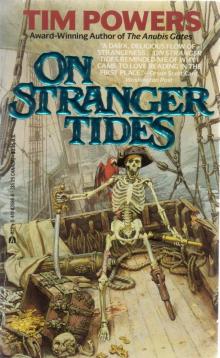 On Stranger Tides
On Stranger Tides Earthquake Weather
Earthquake Weather Forsake the Sky
Forsake the Sky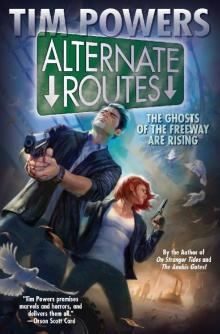 Alternate Routes
Alternate Routes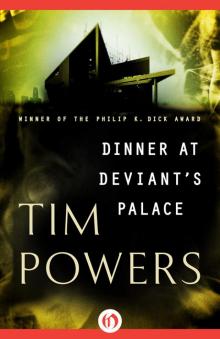 Dinner at Deviant's Palace
Dinner at Deviant's Palace The Stress of Her Regard
The Stress of Her Regard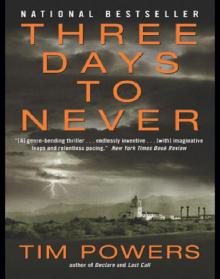 Three Days to Never: A Novel
Three Days to Never: A Novel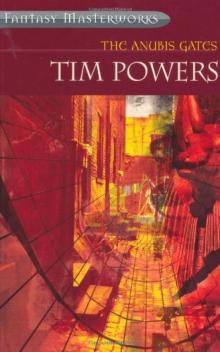 The Anubis Gates
The Anubis Gates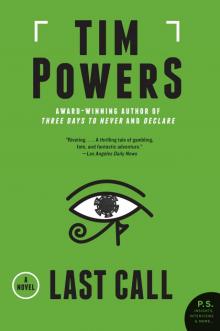 Last Call
Last Call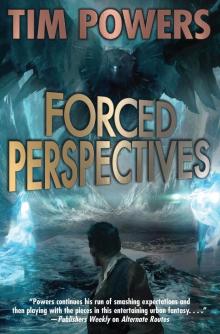 Forced Perspectives
Forced Perspectives Strange Itineraries
Strange Itineraries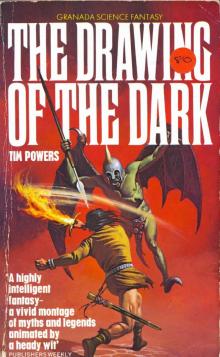 The Drawing of the Dark
The Drawing of the Dark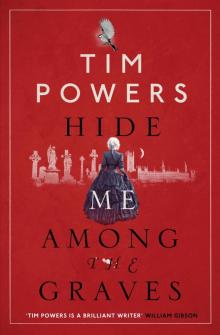 Hide Me Among the Graves
Hide Me Among the Graves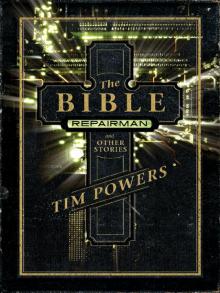 The Bible Repairman and Other Stories
The Bible Repairman and Other Stories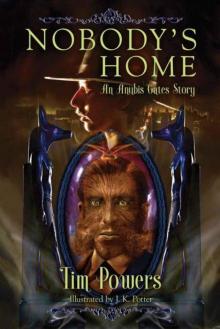 Nobody's Home: An Anubis Gates Story
Nobody's Home: An Anubis Gates Story More Walls Broken
More Walls Broken The Skies Discrowned
The Skies Discrowned Epitaph in Rust
Epitaph in Rust Skies Discrowned and An Epitaph in Rust
Skies Discrowned and An Epitaph in Rust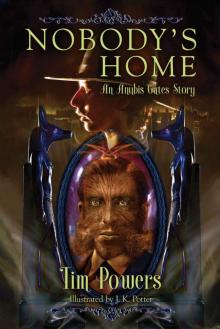 Nobody's Home
Nobody's Home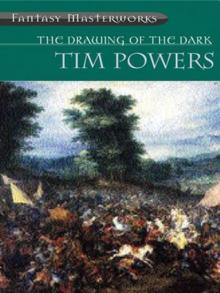 Drawing of the Dark
Drawing of the Dark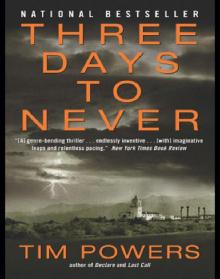 Three Days to Never
Three Days to Never